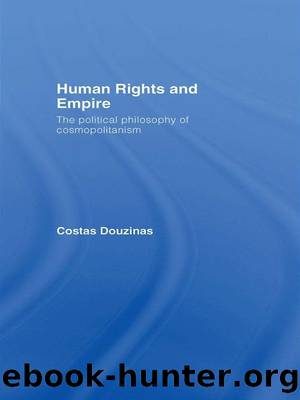Human Rights and Empire by Costas Douzinas

Author:Costas Douzinas [Douzinas, Costas]
Language: eng
Format: epub
Publisher: Taylor and Francis
Published: 2007-03-19T18:30:00+00:00
These revolutionary ideas were initially confined to the austere gaze of the philosopher or promised the idealised perfection of the Hellenistic world. The synthesis of the two great traditions of Athens and Jerusalem, and the concrete application of ideas of political equality would have to wait the political declarations of early modernity.
As the Greek city-states started dissolving, first in the Macedonian and later in the Roman Empire, the idea of a law common to all imperial subjects, of a jus gentium, started to take hold. The Stoics had avoided direct political involvement, but the universal morality they espoused and deduced from rational human nature was of great use to the builders of the Roman Empire as a restraint on ethnic and local nationalisms and individual passions. The late Stoic Chryssipus, for example, described universal humanity as a nation, while for Posidonius, the world was âthe commonwealth of gods and menâ.19 But the Greek Stoics kept their distance from power in the main and imagined the cosmopolis as an ontological and ethical correction of the polis. As a commentator on Chrysippos put it, the Stoic cosmic polis was ânot comparable to the empire Alexander extended to the ends of the earth; it is a question for them of human relationships, free of political formâ.20
This changed with the Romans. The Stoic influence was greatest among people of power, office and affairs. Cicero was a populist orator, pragmatic lawyer and politician, Seneca, Neroâs closest confidant, while Marcus Aurelius, an emperor and general. Cosmopolitanism turned, accordingly, from Cynic philosophy and Stoic ontology into an instrument of rule, no longer the philosophy of an ideal world but a strategy for world power. Cicero started the process. He mis-digested and eclectically revised the main tenets of Stoic thought, turning its rational universality into the ideology of Rome.21 He rationalised Roman law and claimed that many of its central tenents could be traced back to universal rational norms. The Stoics were the first pagans to believe that natural law is the expression of a divine reason, which pervades the world and makes human law one of its aspects. Cicero popularised this idea:
The true law, is the law of reason, in accordance with nature known to all, unchangeable and imperishable should call men to their duties by its precepts and deter them from wrongdoing with its prohibitions . . . nor will it be one law in Rome and a different one in Athens, nor otherwise tomorrow than it is today; but one and the same law, eternal and unchangeable will bind all people and all ages; and God, its designer, expounder and enacter, will be the sole and universal ruler and governor of all things.22
Download
This site does not store any files on its server. We only index and link to content provided by other sites. Please contact the content providers to delete copyright contents if any and email us, we'll remove relevant links or contents immediately.
Killers of the Flower Moon by David Grann(3234)
Machine Learning at Scale with H2O by Gregory Keys | David Whiting(2283)
Will by Will Smith(2040)
Guns, Germs and Steel by Diamond Jared(1881)
Borders by unknow(1785)
The Room Where It Happened by John Bolton;(1719)
The Color of Law by Richard Rothstein(1574)
Once Upon a Broken Heart by Stephanie Garber(1480)
Water Rights and the Environment in the United States by John Burch(1414)
Friends, Lovers, and the Big Terrible Thing by Matthew Perry(1326)
Examples & Explanations: Administrative Law by William F. Funk & Richard H. Seamon(1325)
A Short History of War by Jeremy Black(1299)
Pharmacy Practice and The Law by Richard Abood(1253)
HBR's 10 Must Reads 2022 by Harvard Business Review(1253)
The Strength In Our Scars by Bianca Sparacino(1240)
That Every Man Be Armed by Stephen P. Halbrook(1236)
The Guarded Gate by Daniel Okrent(1219)
515945210 by Unknown(1206)
Injustices by Ian Millhiser(1198)
